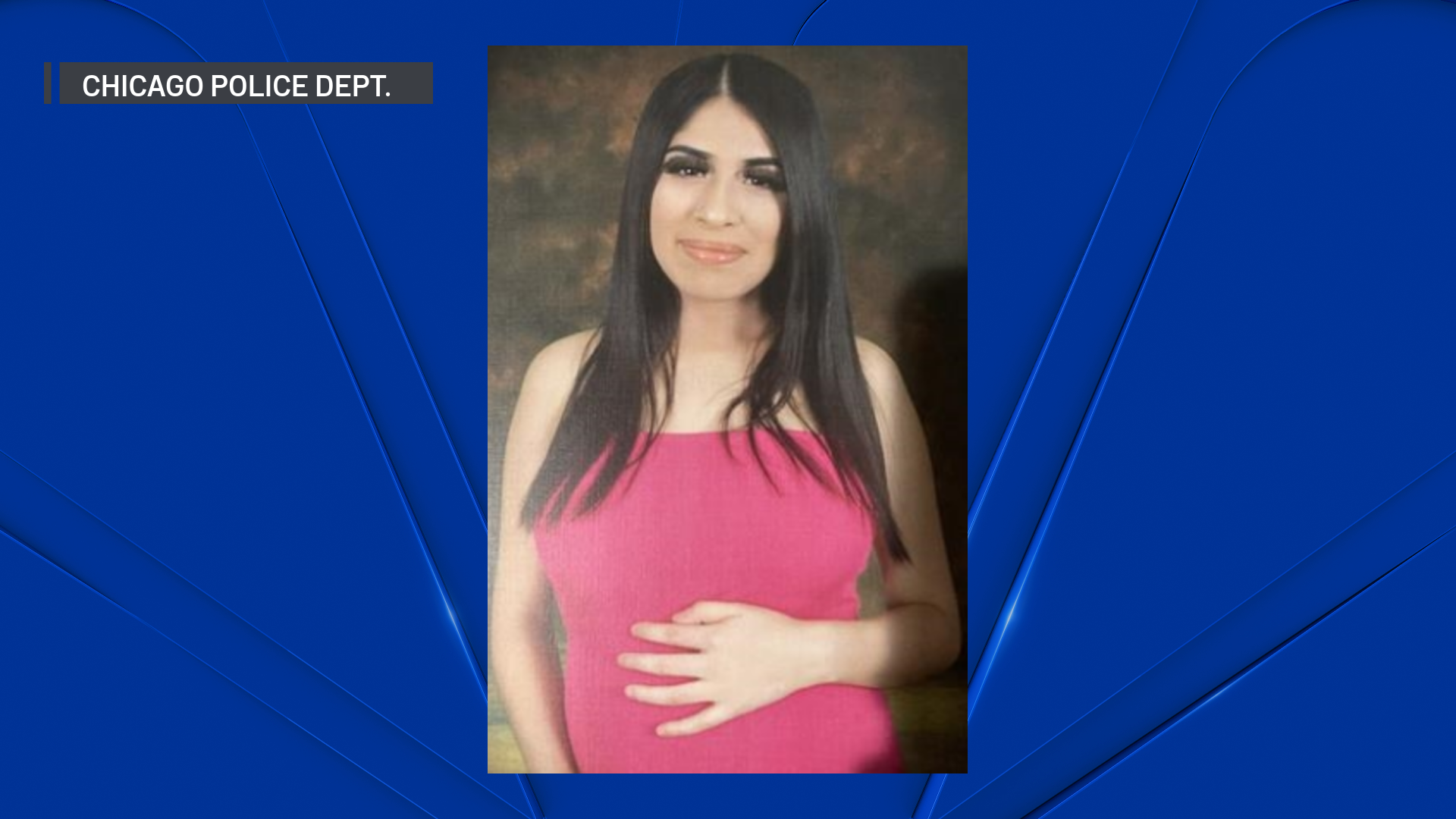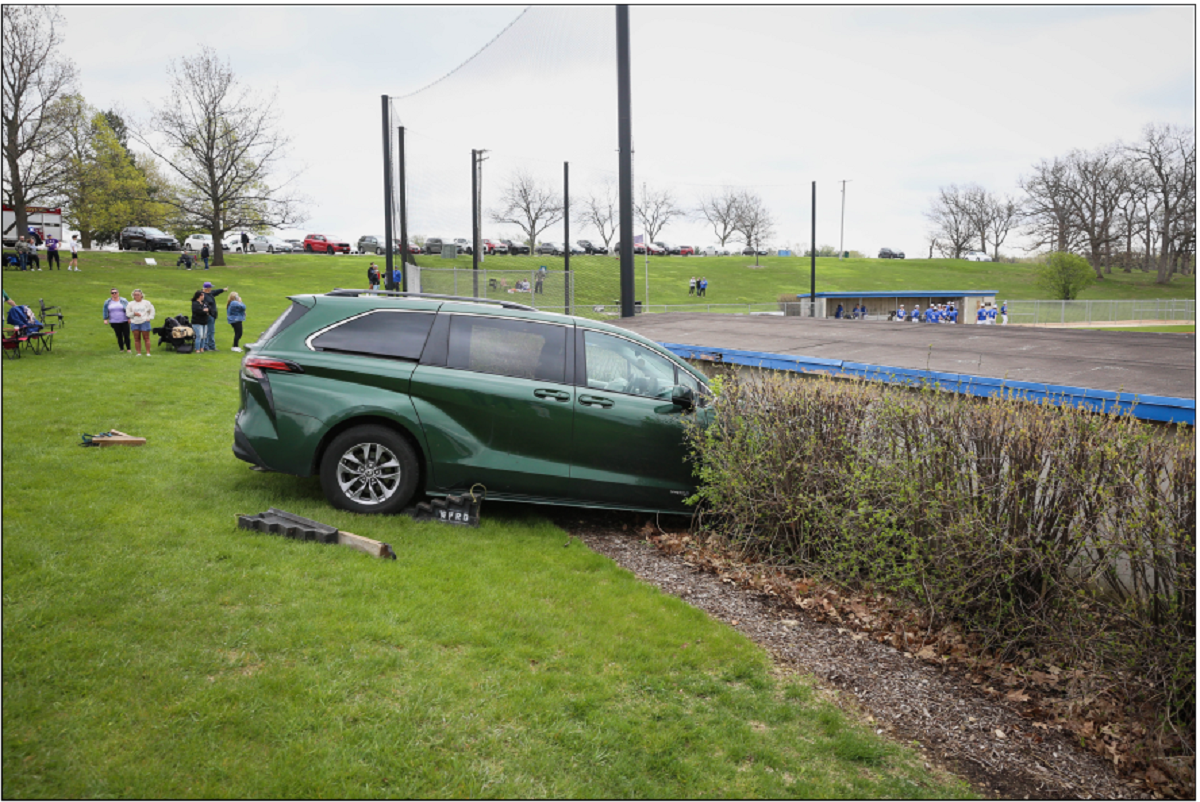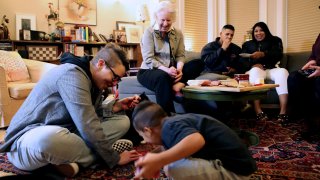
This article was published as part of a Telemundo Chicago-NBC Chicago collaboration with DePaul University to amplify the work of Chicago student journalists.
The home of Kelly Kessler, a DePaul professor, was louder than usual one night in early November. She and her wife Elizabeth Flauto were preparing chicken and dumpling soup to share with who they call their new family.
The Venezuelan couple and their young son had just landed in Chicago five months before, after a long journey from their home country.
The sound of cards flipping — while Kessler and Pablo, the young boy, played cards — intertwined with the sounds of pots clanking, knives cutting cheese and laughter.
Feeling out of the loop? We'll catch you up on the Chicago news you need to know. Sign up for the weekly Chicago Catch-Up newsletter here.
When Emilio Mota came to the U.S. with his partner Albani Rivero and their 4-year-old son, Pablo Mota, they had high hopes of finding safety and a home for Pablo. They were escaping extreme poverty and misery caused by Venezuela’s political turmoil.
They didn’t immediately find a home but they did find Kessler and her wife, who opened their house and heart to them a few days after arriving in the city. Thanks to the couple’s support, the migrant family has a lawyer helping them with their asylum case, and they also have an apartment after months of struggling in the city-run shelters.
Leaving their native country wasn’t easy.
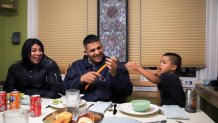
It took Rivero and Mota months to prepare, and the day they decided to make the trek north was “a day of much thinking,” Rivero said.
Local
After their son ingested a poisonous chemical, they realized they could not afford to take him to the doctor. This pushed them to make a definitive decision to say goodbye to their loved ones in Guarico, Venezuela.
For months, the family traveled through South and Central America on foot. When they finally arrived in Chicago, they found themselves feeling hopeless.
Though they had found safety in a migrant shelter at Wilbur Wright College on Chicago’s Northwest Side, they were lost as they tried to navigate life in a new city.
That’s when Flauto, Kessler’s wife, found them in June. The family was standing underneath a tree outside their house in Jefferson Park. Rivero said they were trying to find a way to Skokie to fill out paperwork required by the shelter.
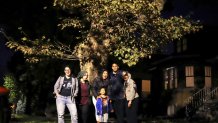
When Rivero saw Flauto come outside, she felt an instinct to ask her for help.
“It was our moment of blessing,” Rivero said.
Neither of them spoke the other’s language.
Mota opened a translator app on his phone. He used it to explain where they needed to go.
Flauto invited the family into her backyard. She offered them fruit and tortilla chips. Her mother-in-law grilled chicken and gave the family as much food as they could carry to take with them.
Flauto arranged transportation for them to get to Skokie and before they left, they exchanged phone numbers.
“So that was day one,” Kessler said. “And it just kind of went from there.”
Later that same week, Mota went to their house to do yard work. But the side job would turn into family dinners.
“He was so dedicated to finding a job and taking care of his family…” Flauto said. “I sort of fell in love with them.”
By November, after countless dinners together, the two families seemed to have become just one.
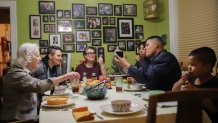
Before they had dinner once more at Kessler and Flauto’s house on Nov. 5, Rivero sat on the couch and turned to Flauto’s mother, Cissy Hubbard, to say, “I love you” in English.
As Flauto prepared soup in a vibrant orange kitchen, Rivero came in and out, helping to prepare the table in the dining room.
It took a few months for the family to feel that comfortable in the Kessler-Flauto house, and those months consisted of a few moments of give and take on both sides.
Kessler and her wife quickly realized that the Mota-Rivero family also needed financial help. So they created a GoFundMe account that raised nearly $10,000 to pay for the lawyers to file their asylum case. Much of their family, friends and DePaul community donated to the fund.
In October, the family was notified that their asylum case was in process, and now Mota has a work permit. This is something that seemed distant and unattainable when they first arrived in the city.
They could not have done it without Kessler and Flauto’s support, the migrant couple said.
Beyond legal difficulties, the Mota-Rivero family faced struggles living in two different migrant shelters before finding a home of their own.
In one shelter, Pablo became sick after getting an infection, Rivero said. Flauto and Kessler gave the family ointments and helped the parents find medical care for the young boy.
Eventually, Kessler took the parents to apply for the public health insurance for Pablo, through the Illinois program for kids.
It has not been easy for anyone, Kessler included. There were long nights when Kessler and her wife would drive the family to Walgreens to get medicine or to take blankets to them in the shelter.
But they all agree it’s been worth it.
“We’ve been really thankful for the ways we’ve been able to help them…” Kessler said. “They’re smart, and they’re kind, and they’re hustling so hard to do all of the things that they’re supposed to do.”
In December, Flauto and Kessler co-signed a lease on an apartment for the migrant family. When Mota and Rivero settled into their new home, they felt “peace.”
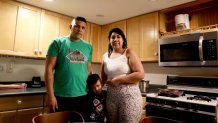
Walking down the stairs to their apartment, there is a red toy car that Pablo drives as he plays in the snow. Mota laughed when he talked about how Pablo had adjusted to the snow much more quickly than they had. The living room is towards the left, where there’s a couch, some chairs and a table with roses displayed. The room looks onto their kitchen with a table sitting in the middle.
The kitchen in their new home feels sacred to them. They were finally able to make a home-cooked meal.
“We made caraotas,” Rivero said, referring to a traditional Venezuelan black bean meal. She smiled as she remembered that moment.
Since then, Mota has gotten a job at Whole Foods. The family also bought a car with some of the remaining money from the GoFundMe donations.
Kessler and Flauto tell them that they will always support them.
As they sat for dinner, Flauto looked at the pictures of her family on the wall behind her and turned towards her phone to translate. Flauto told Mota and Rivero she needed a picture of them on the wall now, and she smiled.
“We adopted a family,” Kessler said.
It was not just about providing financial support. She and her wife wanted the Mota-Rivero family to feel they had a home with them.
“They are our American family,” Rivero said while sitting in the Kessler-Flauto family’s living room.
Luisela Alvaray, a professor of media and cinema studies at DePaul, who is also from Venezuela, has watched the bond between the families grow. Throughout their relationship, she has served as a translator, allowing them to talk more fluidly than the phone app they have used allows.
Last August, right after the families met, Alvaray sat with the families and helped Mota and Rivero to more fully share their story. It was then that Kessler and Flauto understood how their new friends ended up under the tree in their front yard.
“Everybody cried,” Kessler said.
While at first the family was tentative and shy when coming into Kessler-Flauto’s house, now they sometimes come in unannounced. The Mota-Riveros miss their family in Venezuela the most, but they are grateful they were able to meet Kessler and Flauto.
“Truthfully, they’ve been our angels,” Rivero said. “They’re people who have filled us with gratitude and given us unconditional support. They’ve given us so much love.”
This piece could only be written with the help and translations of Alyssa N. Salcedo.

